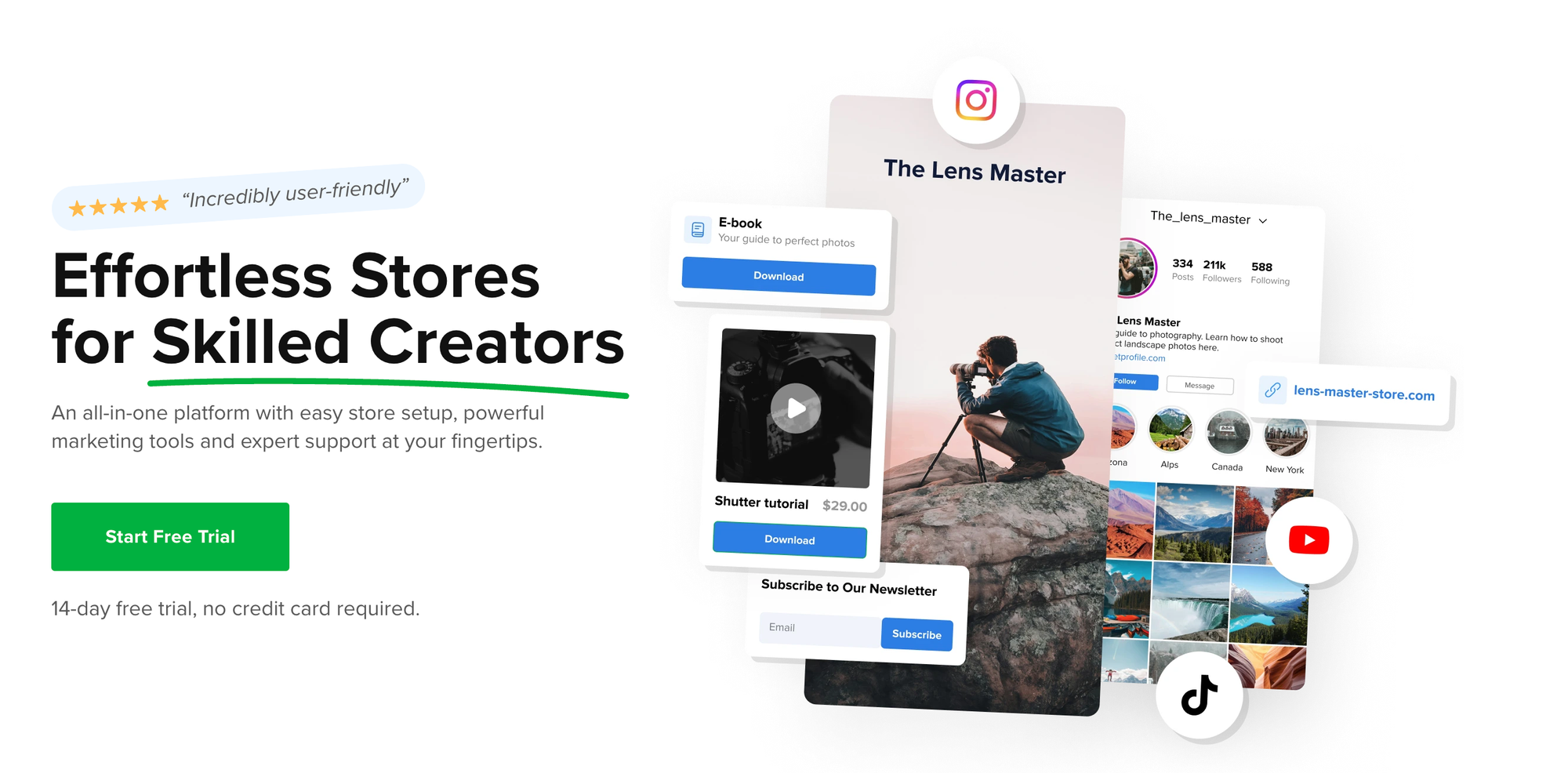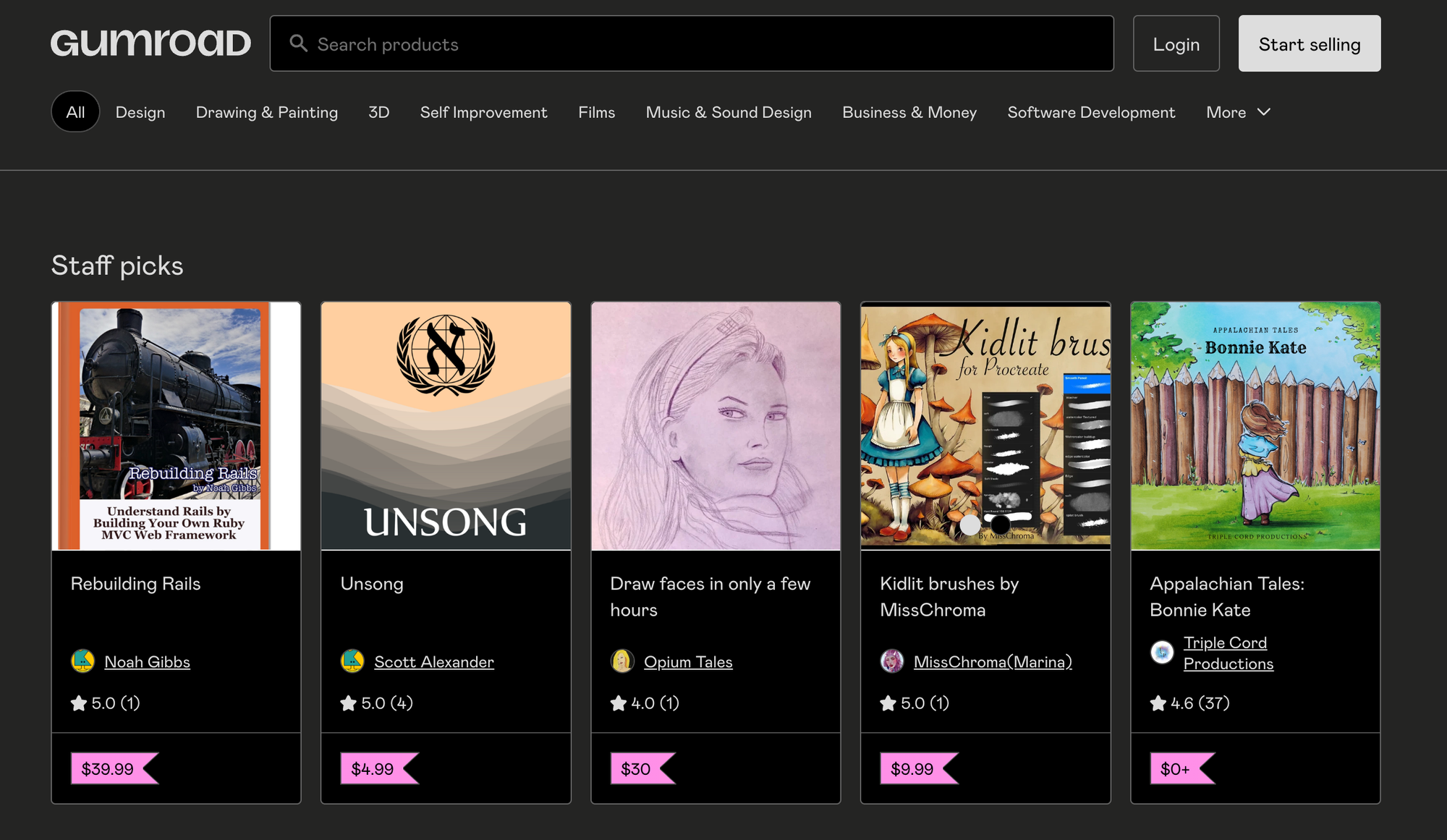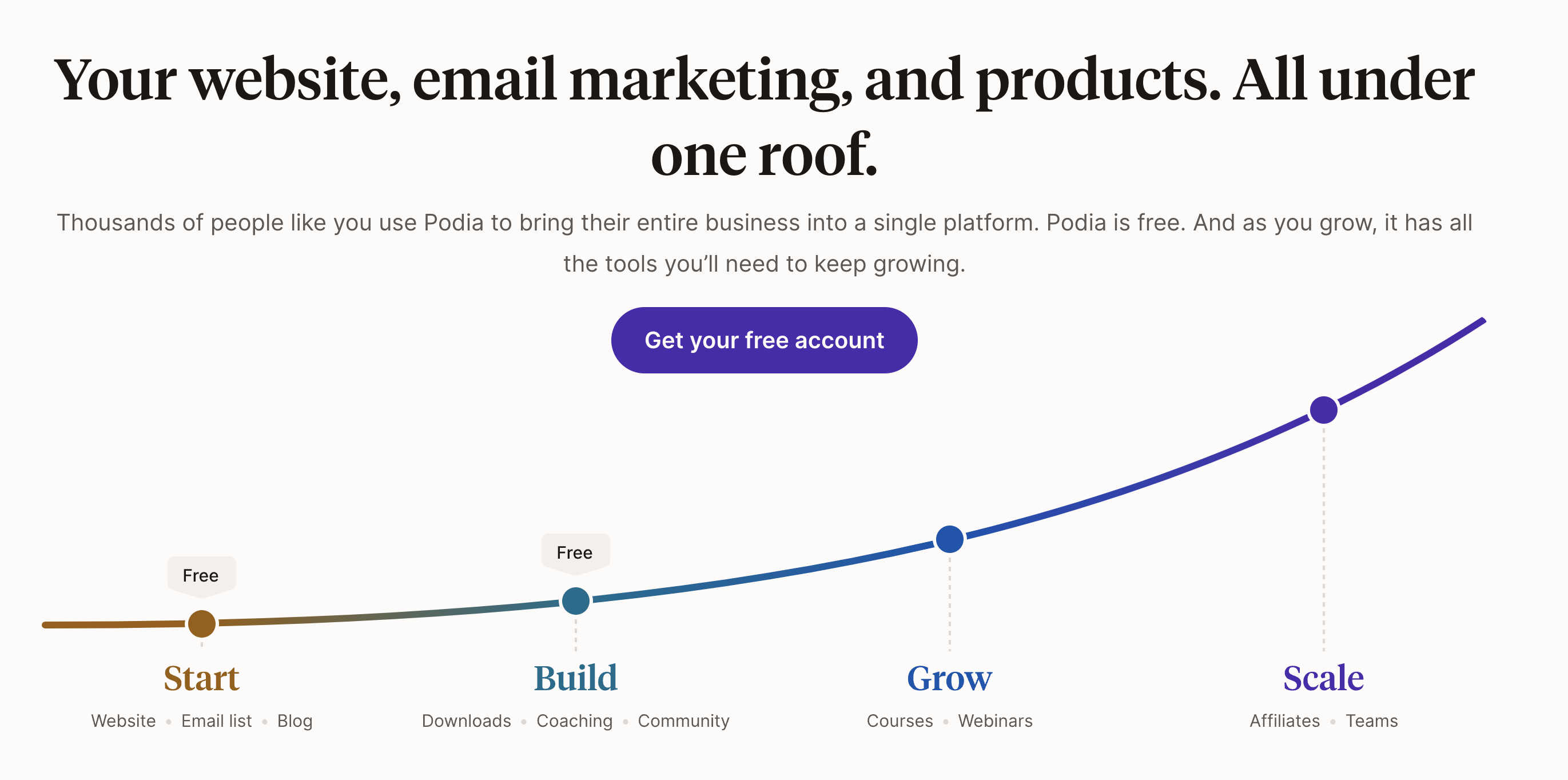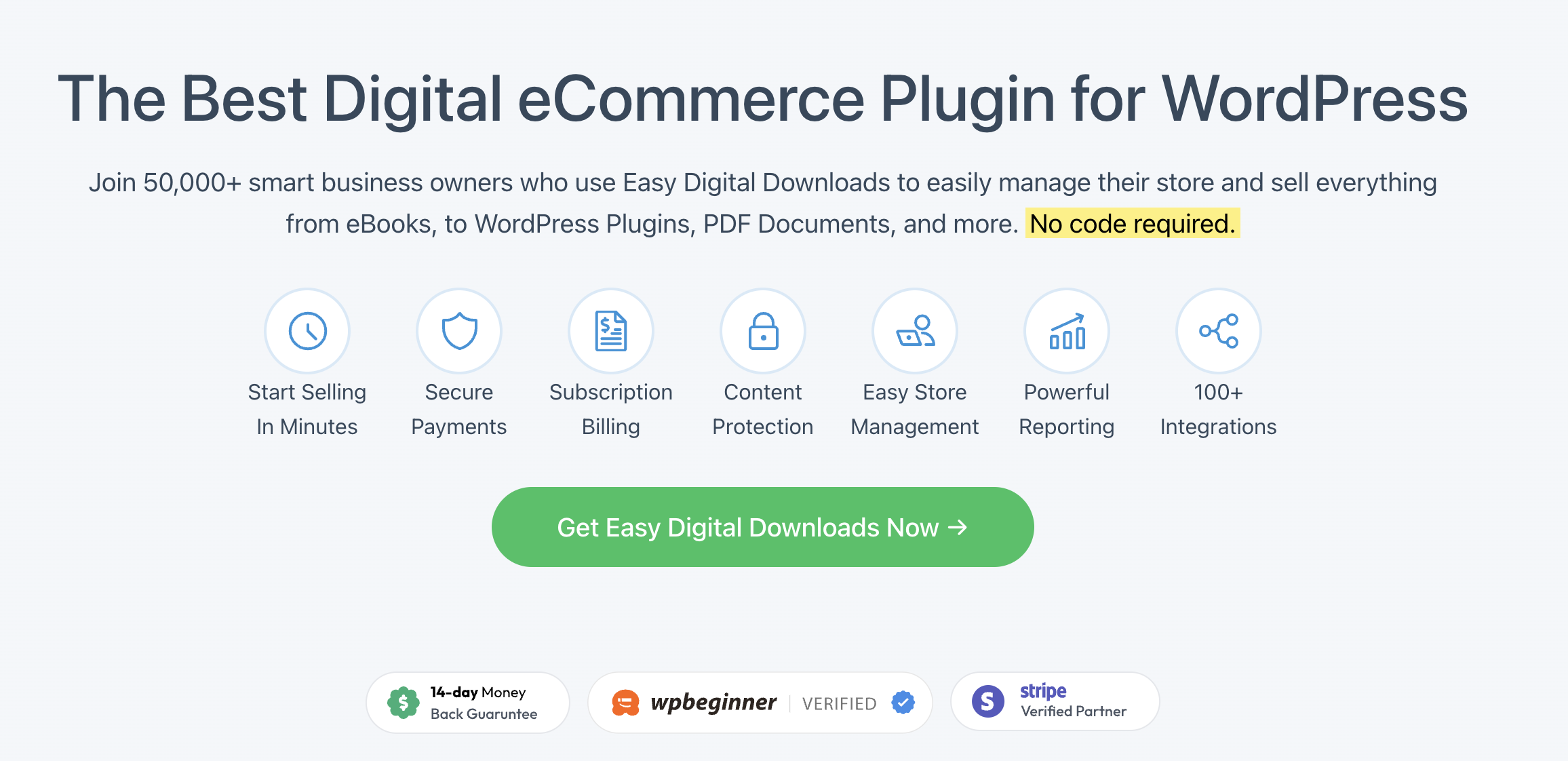Payhip is a popular platform for selling digital products - but is it the right choice for you? Read this article to understand why Payhip works, where it falls short, and discover 10 exciting alternatives.
Key takeaways
- Payhip's limited customization and slow performance drive sellers to seek alternatives with better branding options.
- Transaction-based pricing (Whop, Gumroad) suits low-volume sellers while monthly fees favor high-volume businesses.
- Course creators benefit most from specialized platforms like Thinkific or Teachable with built-in learning tools.
When it comes to selling digital products online, Payhip is a popular platform that many creators turn to. However, this well-known service provider isn't without its drawbacks, with some sellers asking if Payhip is worth it and whether there are alternative services that could better suit their needs.
There are a couple of reasons why sellers may be searching for Payhip alternatives. The first is that while you can sell digital products with Payhip, the platform offers basic interface and customization capabilities. As a result, the platform may not meet the needs of sellers who want to create a unique, branded experience for their customers.
Performance-related issues are another factor for creators looking elsewhere. As Payhip is a place for selling digital products, the sellers need it to be a reliable platform. Unfortunately, some Payhip users have reported slow performance, which is a big problem when selling online. Slow loading times and laggy interfaces can frustrate users, leading to abandoned carts and lost sales.
So who is Payhip's biggest competitor? Let's take a look at a few Payhip alternatives so that you can find the best platform for your business.
What's the best alternative to Payhip?
Here are 10 of Payhip's biggest competitors, including features and pricing.
1. Whop
Whop is a social commerce platform for digital products and services, and it also have a thriving online marketplace. Whop provides a place for entrepreneurs and creators to host and sell their software, apps, ebooks, online communities, services, online courses, and all other kinds of digital products.
With Whop, creators can create their own whop, which is an online hub for their business. Using Whop's native apps, creators can customize their online space by adding exactly what they need for their business and selling access to this in the form of one-off payments or recurring memberships. A user-friendly interface allows creators to easily set up their whop and start selling in just a few minutes.
Sellers can sign up for a free account to start selling right away, or upgrade to an enterprise account to enjoy dedicated support from an expert account manager and get on the Whop marketplace, which is home to millions of buyers looking to invest in their next digital product. Set up takes less than 10 minutes, so there's no reason not to try out Whop as a full-featured Payhip alternative.
Pros:
- User-friendly interface
- Extensive customization options
- Integrated payment processing (card, Apple Pay, PayPal and crypto)
- Supports various types of digital products
- 24/7 web support
- Virtual business partner (enterprise accounts only)
Pricing: Whop offers various pricing tiers, including a free plan that allows you to start selling right away with no paywalled features. You'll pay nothing upfront and just 2.7% + $0.30 on any sales you make. When you're ready to accelerate your growth, get in touch to ask about pricing for enterprise plans.
2. Shopify

Shopify is a popular commerce platform that helps sellers start, grow and manage their online businesses. Stores created using Shopify can be customized, and the platform supports businesses that sell across various channels, including brick-and-mortar locations, online marketplaces, social media, mobile and pop-up shops. Shopify includes tools for managing inventory, payments, shipping and more.
Pros:
- Extensive app ecosystem
- High level of customization
- Strong customer support
- Secure and reliable
Cons:
- Can become expensive with add-ons and transaction fees
- Learning curve for beginners
Pricing: Shopify entices new users with a free trial, but this only lasts three days, which is hardly long enough to test out the platform for sales. Thereafter, you need to pay a monthly fee, the size of which depends on whether you choose a Basic, Standard, Advanced or Plus account, from $9 a month for the Lite Plan (no website included) to $2300 per month for Shopify Plus. There are also processing fees for credit card payments and payments made through third-party providers.
3. Sellfy

Sellfy is simliar to Payhip in that it is designed to be an easy to use platform for digital products. New sellers can open a store with just a few clicks and take advantage of customization options and built-in marketing features. The platform also supports print on demand businesses, making it possible to design, create and sell merch from a single storefront. Once the Sellfy shop is set up, it's easy to add a "buy now" button to an existing website.
Pros:
- Easy to set up and use
- No transaction fees, although there are processing fees for PayPal and Stripe payments.
- Supports a variety of product types, including print on demand
Cons:
- Limited customization options
- Basic reporting and analytics
Pricing: Sellfy offers plans starting at $19/month for the Starter plan, which allows for up to $10k of sales per year. For sellers making up to $50k in sales per year, it's $49/month for the Business plan, which has features for affiliate marketing and upselling. The Premium plan costs $99/month and offers up to $200k in sales, with priority support.
4. Gumroad

Gumroad is a digital product platform that encourages sellers to start small, making micro-sales of products such as blog posts before moving onto more substantial offerings like ebooks.
Many formats of digital products can be sold through Gumroad, from emojis and crypto tips to cookbooks and C4D scenes. The platform includes tools such as email newsletters and automated workflows to help sellers build strong customer bases. When it's time to withdraw income from Gumroad, PayPal and direct deposit are possible options.
Pros:
- Wide range of formats for digital products
- No monthly fee
- Strong community and support
Cons:
- Limited customization
- High transaction fees
Pricing: Gumroad charges a flat 10% fee for sales, in addition to processing fees. There is also the option to list products on Gumroad Discover, which makes them more visible but means an additional fee is charged on every sale.
5. Podia

Podia is another all-in-one platform that sets sellers up with a website and a way to sell products online, but also helps with your email marketing. It's a way to create an ecommerce website without any coding skills. Podia manages the checkout process, takes payments and hosts digital products, such as online courses, digital downloads and webinars. However, some of these products are paywalled behind paid membership plans.
Pros:
- Free plan available
- Full website building tool
- Email marketing features
- Create courses and webinars (on paid plan)
- Community support
Cons:
- 10% transaction fees on free plan
- High monthly fees for advanced plans
- Limited design customization
Pricing: Podia's basic plan is free forever, but comes with transaction fees of 10% in addition to payment processing fees. For just $4/month, the Starter plan gives you a reduction in fees to 8%. There's also the Mover plan at $33/month with 5% fees, or the Shaker plan at $59/month for the first year, which has no transaction fees other than those charged by the payment processing service.
6. Thinkific

Thinkific is a Payhip alternative for experts looking to sell elearning content. The platform invites experts to sell courses and digital downloads, or create communities around their interests. It's possible to build courses directly on Thinkific, including quizzes, videos, surveys and other interactive features to keep learners engaged. While it is a good option for course creators, it does come with high fees.
Pros:
- Create courses and interactive learning communities
- Easy to create landing pages for digital downloads
- Host unlimited courses even on basic plan
- Plus plan customers get a personalized onboarding call and additional training
- 30-day free trial
- Maintain ownership of all content and student data
- Full site hosting included
Cons:
- High monthly fee for Basic plan
- Limits on number of communities and digital downloads except on Grow plan
Pricing: It's free to try Thinkific for 30 days. After that, the cheapest option is the Basic plan, which places limits on communities and digital downloads, and is priced at $49.99 per month. The Start and Grow plans are suited to sellers who want to expand into multiple learning products, with the former costing $99 per month and the latter costing $199 per month. On the higher end of the scale you have the Expand plan at $499 per month, and the Plus plan which comes with custom pricing.
7. Kajabi

Kajabi is a knowledge commerce platform that allows entrepreneurs to offer courses, memberships, coaching, podcasts and more. It's designed to be an all-in-one platform, with tools for creating, marketing and selling digital products, and it does a good job of this, with sellers getting access to analytics to help them track their sales and engagement. However, as with other options in this list, it does come with monthly ongoing fees.
Pros:
- No transaction fees
- All-in-one platform
- Powerful analytics
Cons:
- High monthly fees
- Steep learning curve
Pricing: Kajabi offers a variety of plans, with the least expensive starting at $69 a month and the highest being $399 per month. Enterprise clients can contact Kajabi for custom pricing plans.
8. EasyDigitalDownloads (EDD)

EasyDigitalDownloads is a WordPress plugin designed to sell digital products easily. It integrates seamlessly with popular services like Stripe, Paypal and Mailchimp. It also offers a full-featured shopping cart, complete with customizable discount codes and flexible payment options. However, as a plugin, it does require you to have WordPress knowledge, so it is not as simple as Payhip.
Pros:
- Highly customizable through WordPress
- Large range of extensions
- No transaction fees on Extended and Professional plans
- Unlimited products and transactions
- Free support for all users
Cons:
- Requires WordPress knowledge
- No free plan
Pricing: EasyDigitalDownloads offers several plans, starting at $99.50, billed annually, and going up to $499.50.
9. Teachable

If you're using Payhip to sell courses, you may want to use Teachable instead. Teachable is a platform for experts and educators to offer courses, coaching, communities and downloadable content to eager students. It's useful for bringing in-person classes online or creating digital courses from scratch. With Teachable, you can create a course using the course builder tool, sell PDFs and audio clips, or schedule coaching sessions. Plus, creators have full control over how they price each of their offerings. But to sell on Teachable, you must be transaction fees on top of monthly fees.
Pros:
- Free plan available
- No-code course builder
- Strong creator community
- No transaction fees on Pro and Pro+ plans
Cons:
- 10% transaction fee on Free plan (5% on Basic)
- Free plan allows only one published product of each type
- Limited design customization
Pricing: Teachable offers a Free plan with basic features and transaction fees, Basic at $39/month, Pro at $119/month and Pro+ at $199/month, each with varying levels of features and support.
10. Etsy

Etsy is synonymous with hand-crafted goods, but can also be used to sell digital products that you have created, like coloring books, journals, worksheets, and more. While it is not the greatest platform for digital products, it is a fair option for those who have a few digital downloads to sell.
Pros:
- Large, established customer base
- Easy to set up and start selling
Cons:
- High competition from other Etsy sellers
- Transaction and listing fees
- Limited options for digital products
Pricing: Etsy charges a $0.20 listing fee per item and a 6.5% transaction fee on each sale, plus payment processing fees that vary by country. Additional advertising fees may apply for offsite ads. For all Etsy fees, read this guide.
Choosing the right platform to sell your products
With so many options, how do you choose the best alternative to Payhip?
To make an informed decision, start by identifying what you are selling. If your focus is on digital products such as ebooks, software or digital art, look for platforms specializing in digital downloads, without the need for an online community.
If you are selling educational content or memberships, platforms like Podia, Teachable or Thinkific offer specialized features that cater to these needs. If you want to create a whole ecosystem around your digital products with the option to sell downloads, create courses, and host and create an online community, then Whop is the bets option with a high number of features and budget-friendly pricing.
Of course, make sure to compare the monthly or annual subscription costs across different platforms. Pay particular attention to transaction fees charged per sale, as these can significantly impact your profit margins. Additionally, consider any costs for premium features, extensions or apps that you might need.
You should also look for built-in marketing tools for email campaigns, SEO optimization and social media integration to effectively promote your products. Some platforms offer no marketing features at all, while others like Whop offer SEO features and email features.
Finally, choose a platform that can grow with your business. You'll need to be able to add more products and additional features over time without having to migrate to a more suited platform.
Is Payhip worth it?
Payhip is one way to get started with selling products online, but it's far from the only option. The Payhip alternatives listed above suit many sellers better, but ultimately the correct choice is a personal one.
Whether you choose to sell with Payhip, Whop or another platform, the important thing is to get started as soon as possible. That way, you can get a head start on growing your business and achieve your goal of selling digital products online.
Selling digital products? Sell with Whop

As you can see, there are many different platforms for selling digital products online, but Whop is the one platform that has it all - digital downloads, online courses, the ability to create and sell access to webinars and communities, ebooks, and so much more, for no monthly ongoing fees and only a 2.7% + $0.30 fee per sale.
With Whop, everything is kept in one central space - your whop hub. Your whop is where you host and manage all of your digital products and services and access your seller dashboard. Whop takes care of payment processing, customer service, and order fulfillment, so that you can focus on building your business with ease.



